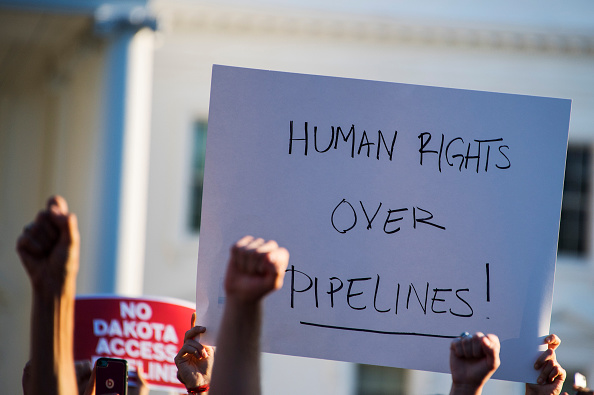CEO says controversial Dakota Access pipeline is 60 percent finished


A free daily email with the biggest news stories of the day – and the best features from TheWeek.com
You are now subscribed
Your newsletter sign-up was successful
In a memo to employees, Energy Transfer Partners chief executive Kelcy Warren vowed to finish building the controversial Dakota Access pipeline, which the Standing Rock Sioux tribe says will disturb sacred ground in North Dakota and adversely affect drinking water for the tribe and those further downstream.
The $3.8 billion project stretches across 1,172 miles and through four states. There is opposition from the Standing Rock Sioux and several other groups, with many protesting near the tribe's reservation and calling for an end to the construction. But Warren disagrees, The Associated Press reports, writing on Tuesday that the project is nearly 60 percent finished and that "concerns about the pipeline's impact on the local water supply are unfounded." He also said the company has "designed the state-of-the-art Dakota Access pipeline as a safer and more efficient method of transporting crude oil than the alternatives being used today," and will work to "communicate with the government and media more clearly in the days to come."
Thousands of people have protested the pipeline in North Dakota, and 22 were arrested Tuesday 70 miles northwest of the main protest site for interfering with construction. The Justice Department and Army Corps of Engineers have halted construction on a part of the pipeline near the Standing Rock Sioux reservation, but hundreds of people gathered in Washington, D.C., for a demonstration, including Sen. Bernie Sanders (I-Vt.), who said: "It is vitally important that we show solidarity with the Native American people of this country. The second issue of global consequence is that we understand that the future of energy is not more oil, it is not more pipelines, it is not more carbon emissions. It is the transformation of our energy system away from oil, away from pipelines, and away from carbon."
The Week
Escape your echo chamber. Get the facts behind the news, plus analysis from multiple perspectives.

Sign up for The Week's Free Newsletters
From our morning news briefing to a weekly Good News Newsletter, get the best of The Week delivered directly to your inbox.
From our morning news briefing to a weekly Good News Newsletter, get the best of The Week delivered directly to your inbox.
A free daily email with the biggest news stories of the day – and the best features from TheWeek.com
Catherine Garcia has worked as a senior writer at The Week since 2014. Her writing and reporting have appeared in Entertainment Weekly, The New York Times, Wirecutter, NBC News and "The Book of Jezebel," among others. She's a graduate of the University of Redlands and the Columbia University Graduate School of Journalism.
-
 ‘Those rights don’t exist to protect criminals’
‘Those rights don’t exist to protect criminals’Instant Opinion Opinion, comment and editorials of the day
-
 Key Bangladesh election returns old guard to power
Key Bangladesh election returns old guard to powerSpeed Read The Bangladesh Nationalist Party claimed a decisive victory
-
 Judge blocks Hegseth from punishing Kelly over video
Judge blocks Hegseth from punishing Kelly over videoSpeed Read Defense Secretary Pete Hegseth pushed for the senator to be demoted over a video in which he reminds military officials they should refuse illegal orders
-
 TikTok secures deal to remain in US
TikTok secures deal to remain in USSpeed Read ByteDance will form a US version of the popular video-sharing platform
-
 Unemployment rate ticks up amid fall job losses
Unemployment rate ticks up amid fall job lossesSpeed Read Data released by the Commerce Department indicates ‘one of the weakest American labor markets in years’
-
 US mints final penny after 232-year run
US mints final penny after 232-year runSpeed Read Production of the one-cent coin has ended
-
 Warner Bros. explores sale amid Paramount bids
Warner Bros. explores sale amid Paramount bidsSpeed Read The media giant, home to HBO and DC Studios, has received interest from multiple buying parties
-
 Gold tops $4K per ounce, signaling financial unease
Gold tops $4K per ounce, signaling financial uneaseSpeed Read Investors are worried about President Donald Trump’s trade war
-
 Electronic Arts to go private in record $55B deal
Electronic Arts to go private in record $55B dealspeed read The video game giant is behind ‘The Sims’ and ‘Madden NFL’
-
 New York court tosses Trump's $500M fraud fine
New York court tosses Trump's $500M fraud fineSpeed Read A divided appeals court threw out a hefty penalty against President Trump for fraudulently inflating his wealth
-
 Trump said to seek government stake in Intel
Trump said to seek government stake in IntelSpeed Read The president and Intel CEO Lip-Bu Tan reportedly discussed the proposal at a recent meeting
